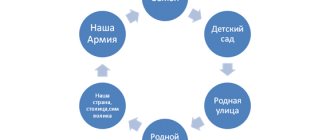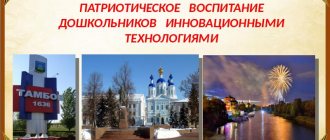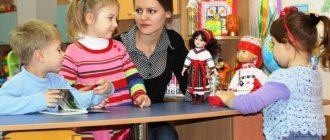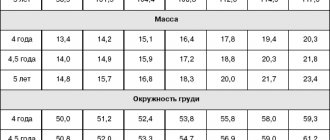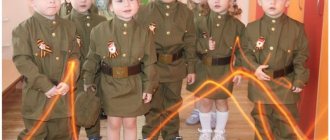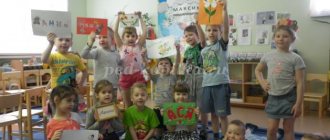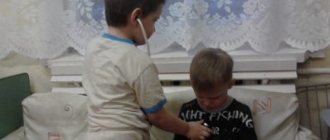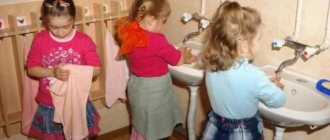Patriotic education of preschool children in kindergarten
Consultations for preschool teachers.
How to raise a little patriot? Question: “What is patriotism? S.I. Ozhegov defined patriotism as “devotion and love for one’s Fatherland, one’s people.” G. Baklanov wrote that this is “not valor, not a profession, but a natural human feeling.” Education of patriotic feelings (from the history of pedagogy) V G. Belinsky, K.D. Ushinsky, N.A. Dobrolyubov and others believed that education in a child becoming a citizen of his homeland is inseparable from instilling in him humane feelings: kindness, justice, the ability to resist lies and cruelty. The teachers argued: “Those high patriotic feelings that characterize a developed adult and which are capable of inspiring him to great deeds and noble deeds are not given to a child ready-made from birth. They arise and develop throughout childhood under the influence of social conditions of life and upbringing.” In a broad sense, patriotism is interpreted as the personification of love for modern life, its achievements and problems. By patriotic education we mean the interaction of an adult and children in joint activities and communication, which is aimed at revealing and forming in the child universal moral qualities of the individual, familiarizing him with the origins of culture, the nature of his native land, and nurturing an emotionally effective attitude. In a broad sense, patriotism is interpreted as the personification of love for modern life, its achievements and problems. The essence of patriotic education is to sow and cultivate in a child’s soul the seeds of love for the native nature, for the native home and family, for the history and culture of the country, created by the labors of relatives and friends, those who are called compatriots. The content of patriotic education is to educate a child from the first years of life to have a humane attitude towards the world around him, love for his relatives and family, home, region, city, town, homeland, respect for people of different nationalities, state symbols (the anthem, flag, coat of arms of the Russian Federation) . Development of humane feelings in the process of patriotic education: the formation of ethical ideas, skills of cultural behavior, social and public qualities, respect for adults, a responsible attitude to carrying out assignments, the ability to play and work together, the ability to fairly evaluate one’s actions and the actions of other children. Appeal to the paternal heritage fosters: Respect for the land on which the child lives, pride in it. (children need to know the way of life, everyday life, rituals, beliefs, the history of their ancestors, their culture). Knowledge of the history of your people, native culture (will help in the future to treat the history and culture of other peoples with great attention, respect and interest). The feeling of patriotism is multifaceted in content: it is love for one’s native places, and pride in one’s people, and a feeling of one’s inseparability with the entire surrounding world, and the desire to preserve and increase the wealth of one’s homeland. Objectives of patriotic education: nurturing in a child love and affection for his family, relatives home, kindergarten, native street, city; formation of a caring attitude towards native nature and all living things; instilling respect for people's work; developing interest in folk traditions and crafts; formation of basic knowledge about human rights; expanding ideas about Russia, its capital; introducing children to the symbols of the state: coat of arms, flag, anthem; developing a sense of responsibility and pride for the achievements of the Motherland; the formation of tolerance, a sense of respect and sympathy for other people, nations, and their traditions. The tasks of patriotic education are solved in all types of children's activities: In direct educational activities, in productive activities, in play activities, in work activities, in everyday life, etc., since they raise a patriot in a child all his life: in kindergarten and at home, his relationships with adults and peers. Conditions for effective work on instilling patriotism in preschool children: an integrated approach; the teacher’s knowledge of the history and culture of his people; correctly selected material (based on the principle of accessibility and understandability); thematic structure of the material; the preparedness of teachers and parents to solve the problems of educating children's patriotism, close cooperation between kindergarten teachers and family members, in establishing trusting business contacts with the families of pupils, involving family members in the pedagogical process, creating a substantive development environment in the kindergarten and family. Means of patriotic education: oral folk art; decorative and applied arts; music; fiction; a game; independent children's activities. Features of patriotic education: A preschooler, first of all, must recognize himself as a member of the family, then a citizen of Russia, and only then an inhabitant of planet earth. You need to go from near to far. Forms of organizing work with children: conversations, didactic games, travel games, excursions, conversation games, dramatization games, entertainment, etc. V. A. Sukhomlinsky “The beauty of the native land, revealed through fairy tales, fantasy, creativity, is a source of love to the Motherland. Understanding and feeling the greatness and power of the Motherland comes to a person gradually and has its sources in beauty." The most important thing is to remember that a responsible approach to business, a mother’s attitude towards a child, a benevolent acceptance of his independence, and not the establishment of petty guardianship over him - all this is folk pedagogy (also a component of patriotic education), and even under normal conditions it will help to implement the program, the content of which must first be mastered by the adults themselves.b/
We recommend watching:
Raising patriotism in preschool children Synopsis of joint educational activities in the preparatory group Knowledge of the surrounding world in kindergarten Moral and patriotic education of children in kindergarten
Similar articles:
Summary of a lesson in the preparatory group on the topic: “The Baptism of Rus'”
Conversation about courage with older preschoolers
Conversation about hard work in the preparatory group
Conversation with children 5-8 years old. Russian anthem
About the Russian flag for children 5-7 years old
Features of patriotic education of preschool children
Dear friends, we are pleased to introduce you to Elena Stepanovna Akimova, teacher of the MADO DS 68 “Romashka” in Nizhnevartovsk, Tyumen region. Today Elena Stepanovna is pleased to share with us useful material about the features of patriotic education of preschool children. The article will be of interest to preschool teachers and interested parents.
A short commentary on the article from Elena Stepanovna:
“The process of patriotic education must begin in preschool age. During this period, the formation of cultural and value orientations of the spiritual and moral basis of the child’s personality takes place, the development of his emotions, feelings, thinking, mechanisms of social adaptation in society, the process of national and cultural self-identification and self-awareness in the world around him begins.”
Useful reading...
Features of patriotic education of preschool children
The process of patriotic education must begin in preschool age. During this period, the formation of cultural and value orientations of the spiritual and moral basis of the child’s personality takes place, the development of his emotions, feelings, thinking, mechanisms of social adaptation in society, the process of national and cultural self-identification and self-awareness in the world around him begins. This period of a person’s life is the most favorable for the emotional and psychological impact on a child, since the images of perception of reality and cultural space are very vivid and strong and therefore they remain in memory for a long time, and sometimes for a lifetime, which is very important in the education of patriotism. At the same time, it should be noted that a holistic scientific concept of the formation of a citizen, a patriot of Russia in modern conditions has not yet been created. In this regard, practicing teachers have many questions, including: what is included in the content of patriotic education today, and by what means it should be implemented.
The essence of patriotic education is to understand and cultivate in a child’s soul the seeds of love for the native nature, for the native home and family, for the history and culture of the country, created by the labors of relatives and friends, those who are called compatriots. Inheriting the moral and aesthetic values of one’s native culture at a very tender age is the most natural, and therefore the surest way of patriotic education, instilling a feeling of love for the Fatherland.
To inherit means to make it your own, to master the heritage that was created, acquired, accumulated by previous generations. The cultural heritage of the people is a huge wealth that every child needs to learn how to properly manage, own it in such a way as not to squander it, not to crush it into trifles, but to preserve and increase it, embodying it in the treasure of their inner world, their personality, in further creative creation.
Patriotism is one of the moral qualities of a person, which is formed already in preschool age, and, like any moral quality, it includes:
- content component - children mastering a range of ideas and concepts about the world around them that is accessible to their age: the social structure of society, the life of the Russian people, the history of the country, culture, traditions of the people, the nature of their native land, the development of correct views on the facts of the social life of the country;
- emotional-motivating - the individual experiences a positive emotional attitude towards the acquired knowledge, the world around him (love for his hometown (village), region, country, pride in the labor and military successes of the people, respect for the historical imbibition of his native country, admiration for folk art, love for his native language, nature of the region.
- active component - the implementation of emotionally felt and conscious knowledge in activities (providing assistance to adults, showing care for them, readiness to complete an adult’s task, caring attitude towards nature, things, public property, the ability to reflect acquired knowledge in creative activity), the presence of a complex of moral and volitional qualities, the development of which ensures an effective attitude towards the environment.
Already from childhood, a person should be proud of his nationality, love his homeland, know his native language, and be interested in the culture and history of his people.
The period of preschool childhood, in terms of its psychological abilities, is the most favorable for the education of patriotic feelings, because preschool children are characterized by boundless trust in adults, the desire to repeat their actions, emotional goodwill, interest in the world around them, and sincerity of feelings.
The impressions experienced in childhood can be compared to letters carved on stone. They remain for life, having a profound impact on human development. The characteristic features of Russians are concentration and collectivism, openness and the ability to absorb and dissolve in themselves the spiritual values of other peoples; lack of pronounced ethnic identification, lack of understanding that we are a distinctive nation.
In order to raise a patriot of one’s Motherland in our time, it is necessary to instill in children from kindergarten a love for their native language, for the historical and cultural heritage of the people, for the Fatherland.
Based on the age characteristics of older preschoolers, we will try to highlight the following features of instilling patriotism in older preschoolers.
1. The education of patriotism begins with a feeling of love for the mother, for family and friends, with the child feeling their warmth, attention and care. The education of patriotism involves the gradual formation of filial love, sympathy for another person, friendly affection, etc.; These first childhood emotions later become the basis for the emergence of more complex social feelings. There is a peculiar transfer of these human emotions that arose in early childhood from close to distant, from a narrow to a broader area of social relations, which in the course of the child’s development acquire the same deep personal meaning as his relationships with parents and relatives: “Love for mother: Love for the Motherland”, “Love for the Father: Devotion to the Fatherland”. Nurturing patriotism in a preschooler means nurturing love and affection for the small Motherland, for the place where the child was born and where the graves of ancestors are located, which in the future becomes the basis for devotion, love, and respect for one’s country.
Nurturing patriotism presupposes a feeling of satisfaction and attachment to the place of birth and residence, a certain circle of people, which expands and deepens from meetings and communication with other adult residents of the house, village, city, employees of the zoo, museum, library, theater, from getting to know local attractions, with the nature of the native land. “Born”, “parents”, “relatives”, “native home”, “native kindergarten, native street, village, city, region” - all these and many other words and expressions gradually form in the child the concept and feeling of the Motherland.
2. The figurative expressions “Love for the motherland”, “Devotion to the Fatherland”, “Father’s land”, etc. indicate that the origins of patriotic (from the Greek patris - homeland) feelings, high human emotions lie in the experiences of early childhood.
The origin of such feelings is internally determined, as studies by Ya.Z. Neverovich. The development of emotions, as noted by A.N. Leontyev, L.I. Bozhovich et al., is closely related to the development of behavioral motives, with the emergence of new needs and interests in the child. Throughout childhood, not only a profound restructuring of organic needs occurs, but also the assimilation of material and spiritual values created by society, which, under certain conditions, become the content of the child’s internal motivations.
3. Each age stage of preschool childhood has its own priority means of instilling patriotism. In early preschool age, this is the activity of the adult himself as a bearer of a positive way of behavior, as well as works of folklore - nursery rhymes, songs, fairy tales.
At the next stage of education, which coincides with the age of 4-5 years, the child gradually becomes aware of moral values. He is already capable of basic generalization of personal experience accumulated at a young age. Ideas about the nature and ways of demonstrating a positive attitude towards adults, children, and nature are consolidated. The teacher attracts children's attention to the ways in which another person expresses their emotional state, teaches them to “read” the emotions of the external state of plants and animals, and encourages the child to respond appropriately (to feel sorry, sympathize and help or be happy for him). In addition to practical situations that arise in children's lives, they can already be taught to solve verbal logic problems (“What would you do if”). Verbal resolution of situations is very useful at this age: it allows the child to solve a problem in an imaginary, “safe” version, to make a choice of behavior based on both his own life experience and other sources; promotes the development of imagination and thinking. A general specific means of instilling patriotism is the child’s activity, since preschool children develop most effectively only in the process of their own activity.
For preschool children, joint activities with adults and peers are especially important for the development of personality traits and the formation of an emotionally effective relationship with others. In the process of joint activity, the rudiments of a collective opinion are formed, and the influence of the group on the emotional development of the child increases.
Data obtained as a result of research by A. D. Kosheleva show that forms of joint activity, where the success of one depends on the achievements of the other, where coordination of efforts and coordination of actions performed are required, generally contribute to the establishment of positive emotional relationships. However, there are cases when, with well-established business relationships, empathy and sympathy for each other in children are not sufficiently developed.
Among foreign social psychologists, there is a widespread view that interpersonal relationships are initially predetermined by the emotional attitude of group members, likes or dislikes towards persons from their own experience who have certain properties.
Research by domestic scientists says that the starting point here is not past experience, but forms of practical interaction of the subject with others, forms of interaction aimed at achieving some practical goals, at helping another person, at satisfying his needs, at alleviating his suffering, etc. etc., which necessarily requires orientation to the state of this other, to his needs, to his joys and sorrows. Based on external practical interaction with others, the forms of which are cultivated by society, the child develops internal emotional relationships with people, empathic experiences arise, which play an important role in the development of moral motives of behavior.
The main, and at early stages - the only type of activity that determines the development of children's feelings, is practical, sensory-objective activity, carried out by the child jointly and in the process of communicating with other people. Later, on the basis of external, practical activity, the child develops a special internal form of active affective-figurative imagination, this, as defined by L.S. Vygotsky, the “second expression” of human emotions, during which they not only manifest themselves, but also transform and develop.
If at relatively early stages of age and functional development affects arise, so to speak, post factum, when the child has already encountered a certain affectogenic situation or when his actions have already led to positive or negative results, then later anticipatory emotional regulation of actions arises, based on emotional anticipation the possible consequences of the actions taken and the significance of the situation that will arise upon their completion for the child himself and for those around him.
The development of the ability for emotional anticipation allows the child not only to foresee in advance, but also to anticipate the long-term results of his actions, which makes it possible to avoid erroneous actions that do not correspond to his basic needs and value systems, which could easily arise under the influence of random circumstances and fleeting desires, if if their consequences were not previously understood and experienced emotionally. The basis of such anticipation is, apparently, that functional system of integrated emotional and cognitive processes, that unity of affect and intellect, which L.S. Vygotsky considered characteristic of higher, specifically human feelings. By being included in this system, emotions become smart, generalized, anticipating, and intellectual processes, functioning in a given situation, acquire the character of emotional-figurative thinking, which plays such an important role in the discrimination of meaning and goal formation.
L. S. Vygotsky, having laid the foundation for the activity approach in psychology, believed that psychology without the doctrine of emotions is worth little and threatens to turn into a discipline that studies not a person, but some ingenious logical machines. According to his psychological concept, the essence and sources of origin of the deepest and most intimate that is in a person lie not in himself, not in his internal, bodily, intraorganic processes and not in the properties immanently inherent in his spiritual organization, but in his external, objective -sensual activity, in relationships with other people, in works of culture created by society, including artistic culture, in art treasures.
4. The education of patriotism is successfully carried out in the process of introducing children to cultural heritage. K. D. Ushinsky believed that the education system is generated by the history of the people, their material and spiritual culture. Fertile pedagogical material has been accumulated for centuries in oral folk art, in folk applied arts and various folk crafts, in folklore and classical works, in the works of Russian masters of painting, sculpture, and architecture, which are so close and understandable to preschool children. Folk culture and art, with their capabilities, create in modern conditions the most favorable environment for identifying and developing national characteristics in a child. V.V. Zenkovsky wrote: “No one can be considered a son of his people if he is not imbued with those fundamental feelings with which the national soul lives: We can, however, assert that we cannot mature outside of the national culture, which we must be imbued with in order for those inherent in our soul forces could receive their development.”
5. The education of patriotism is carried out through the formation of a national spiritual character in a child. I.A. In this regard, Ilyin wrote: “to educate (a Russian child) and develop character in him means, first of all, to open to him, his instinct, his deep irrational sensitivity, his passion, the ability and happiness to selflessly love: the Motherland: and believe in it.”
Therefore, even in the family, in kindergarten, it is necessary to create conditions for the emergence and development in children of respect for the labor skills and creative crafts of the ancestors of the Russian people (use family archives, museum exhibits). It is necessary to acquaint children with the characteristic traditions and customs of the Russian people, to arouse interest and the desire to observe them. It is very important to introduce preschool children to the fundamental moral values of their people, to form a positive attitude towards them and a desire to observe them in everyday life.
Compliance with national traditions and customs ensures connection and continuity of generations; the spiritual and moral life of the people rests on them. For example, folk traditions make it possible to feel and understand the national characteristics of their people (for Russian people - kindness, generosity, optimism). The atmosphere of the holiday brings people together, makes them closer, allows you to understand why they are like that, where their roots are. K. D. Ushinsky wrote: “Let everyone remember his childhood, and he will see that a holiday for a child is not at all the same as for us, that this is really an event in a child’s annual life and that a child counts his days from holiday to holiday, like we count our years from one important event in our life to another: childhood would be so dull and gray if we were to choose holidays from it.” The soul of the people, high traditional national values: openness, conscientiousness, responsibility and justice - are successfully learned by children through folk songs and fairy tales, and folk wisdom easily enters the life and memory of a child through signs, proverbs, and sayings.
6.An important factor in patriotic education is nature. Nature is given a special role in the education of patriotism, since it constantly surrounds the child, enters his life very early, is accessible and understandable to him. He feels strong and significant with representatives of wildlife, because he can do something for them: help, save lives. The child begins to understand that he is a creator, he acquires responsibility, and his self-esteem increases.
A child’s life in harmony with nature helps to strengthen his health and has a beneficial effect on mental development. Nature and life are recognized by the people as the best educators. Free labor, as K.D. taught. Ushinsky, a person needs him on his own, to maintain his sense of human dignity. In the lap of nature, a child is encouraged to devote himself for a long time and inseparably to the observation of one phenomenon, one impression. As a result of this, concentration and depth of thought are cultivated in him. Nature enriches the children's mind with important knowledge and interesting information and thereby contributes to a broader and more comprehensive growth of children's intellectual powers. According to G.N. Volkova, “nature is one of the most important factors in folk pedagogy; it is not only the habitat, but also the native land, the Motherland. The nature of the homeland has an inexplicable power over man. Conformity to nature in folk pedagogy is generated by the naturalness of folk education.
Therefore, it is quite legitimate to talk about ecology as a universal concern of humanity - the ecology of the surrounding nature, the ecology of culture, the ecology of humans, the ecology of ethnic entities. And the little ones too. Russians talk about human nature, about the natural mind, and this makes a lot of sense, and this is consistent with the democratic, humanistic features of folk pedagogy - with the naturalness of folk education. Nature is the courtyard of the father’s house, the Universe, and outer space. Even the stars in the sky of our homeland are relatives. Let us remember their popular names: “Ursa” (Big and Little), “Milky Way”. The weather is predicted by the stars, by their blinking, glow, color, and by their location the road to your home is found.” The humanized images of the homeland, native nature in folk art are charming: the father oak, the Mother Volga, the white bird cherry in a girl’s dress, the “crane’s eye” spring.
Whatever is in accordance with nature must be considered good; which contradicts its development - as evil and perversion. This pedagogical principle was deeply and comprehensively substantiated by Ya. A. Komensky. In traditional pedagogy, the words “good”, “natural” and “natural” and, conversely, “bad”, “evil”, “unnatural” or “unnatural” are considered synonyms. Rousseau, Pestalozzi, Ushinsky, Tolstoy stood in the same positions. As for V. A. Sukhomlinsky’s system of education, it is entirely in accordance with nature, life-conforming, and this is its strength. “The highest wisdom in life is for a person to entrust himself to nature, to go through life relying on it, to let it guide him. The principle of conformity with nature is the highest, basic principle of all education” (A.M. Kushnir), of all human life.
External factors also influence the effectiveness of instilling patriotism in preschool children. During the preschool period, the formation of a child’s personality traits is virtually completely determined by external educational influences. The direction of the child’s internal motivational aspirations is determined by the nature and direction of the educational influences of the environment, educators and the characteristics of the hereditary genetic structure of the body (the latter can also be attributed to external factors in relation to the developing personality: the child does not choose them and is not able to influence them). The activities of children at this age are organized by adults; the capabilities of children here are still so insignificant that in practical terms one can make the statement that the child is almost completely dependent on external factors. The process of child development, conditioned by upbringing and living conditions, is at the same time characterized by its own logic, stimulated by internal contradictions and their resolution. This feature of child development makes it extremely important to create those pedagogical conditions that are conducive to a qualitative change in the child’s personality, his relationships with others, initially in joint activities with an adult and under his influence, and then in the free independent activity of the child.
V.G. Nechaeva identifies two groups of methods of patriotic education of preschoolers: organization of practical experience of social behavior (training method, demonstration of actions, example of adults or other children, method of organizing activities); (formation in preschoolers of moral ideas, judgments, assessments (conversations, reading works of art, viewing and discussing paintings, illustrations). The author includes the method of persuasion, positive example, encouragement in both the first and second groups and punishment.
The classification proposed by V.I. Loginova is built on the same basis as that of V.G. Nechaeva - on the activation of the mechanism of patriotic education - but it is more complete. The author proposes to combine all methods into three groups: methods of forming patriotic behavior (training, exercise, activity management); methods of forming patriotic consciousness (beliefs in the form of explanation, suggestion, conversation); methods of stimulating feelings and relationships (example, encouragement, punishment).
It is probably possible to choose other bases for classifying methods of patriotic education, although the most appropriate is the one that corresponds to its mechanism.
No matter how good the methods are, they give effective results only under certain conditions:
- any method (group of methods) must be humane, not humiliating to the child, and not violating his rights. This applies to children of any age—infancy, preschool, and school;
- the method must be real, feasible, it requires a logical conclusion;
- To use the method, conditions and means must be prepared in advance;
- The method should not be applied in the same way, stereotyped way to all children and in any situation. If this condition is not observed, the method of persuasion can turn into edification and cease to bring the desired result;
- Educational methods should be used tactfully. The pupil should not feel that he is being raised. Indirect influence is a great art, which a teacher masters if he knows how to treat the child with care;
- when selecting methods, the degree of complexity of the quality being formed should be taken into account;
- When designing and selecting methods, it is important to foresee the possible results of their impact on a particular child. If the teacher is not sure of success or anticipates too strong a reaction, the chosen method should be abandoned;
- the use of patriotic education methods requires patience and tolerance. When it comes to a child of preschool age, you cannot count on instant and permanent results.
We should patiently repeat the methods already used and select new ones, with the understanding that the result will not be achieved immediately and, perhaps, not quite in the form and quality that we expect;
- Practical methods that involve teaching the child methods of action should prevail in the patriotic education of preschoolers. If you only rely on awareness, understanding the significance of positive behavior and do not teach ways of such behavior, the desired results will not happen. So, let's turn to the well-known method of using an adult as a role model. It is impossible to count on the impact of this method without organizing observation and practice of the child’s behavior. The positive actions of an adult in themselves do not guarantee the same actions in a child;
- methods are not used in isolation, but in combination, in interconnection. The basis for selecting methods that can and should be used in combination is the leading educational task and the age of the children.
Thus, the features of patriotic education of children of senior preschool age, in our opinion, are:
- developing an interest in the history of one’s family, pedigree, the history of the city, village where the child lives, a sense of belonging to them; caring attitude, manifested in deeds and actions; interest in the traditions of the family, city and the desire to follow them; respect for the defenders of the family and the city and a caring attitude towards them;
- formation of interest in folk culture, spiritual connection with the native people;
- education of high human emotions that lie in the experiences of early childhood;
- formation of a national spiritual character in a child;
- development of the ability to notice the state of the surrounding nature and adequately respond to it, the need to express one’s emotions, attitude towards the nature of one’s native land in musical and poetic images, in creative, productive, playful activities; formation of a caring attitude towards the nature of the native land;
- joint emotional and sensory activity of children and adults;
- close interaction between educators and parents, museum and library workers;
- creating a heuristic environment in kindergarten and in the family;
- creation of pedagogical conditions for instilling patriotism in children of senior preschool age.
LIST OF REFERENCES USED:
1. Bogomolova M.I. International education of preschool children. - M., 1988.
2. Bykov A.K. Problems of patriotic education. //Pedagogy. 2006. No. 2. P. 37-42.
3. Vinogradova N.F., Kulikova T.A. Children, adults and the world around. - M., 1993.
4. Dmitrieva V.G. Patriotic education of preschool children // Kindergarten from A to Z. - 2003. - No. 3. - P. 2.
5. Evdokimova E. Project model of civic education of preschool children. // Preschool education. - 2005. - No. 3 - P. 6-13.
6. Zhukovskaya R.I. On instilling a sense of patriotism in preschool children // Soviet pedagogy. - 1974. - No. 4.
7.Zurabova K. How to educate a defender. //Preschool education. 2003. - No. 2. P.39 – 42.
8. From childhood to adolescence: a program for parents and educators on the formation of health and development of children from 1 to 7 years old / T. N. Doronova, L. N. Galiguzova, L. G. Golubeva, etc. - M.: Enlightenment, 2006.
9. Kalugina N. Patriotic education of preschoolers from work experience. //Preschool education. 2008. - No. 4. P.66-70.
10. Kozlova S.A., Kulikova T.A. Preschool pedagogy. – M.: “Academy”, 2002. – 416 p.
11.Kozlova S.A. Moral education in the process of familiarizing schoolchildren with social reality. - M., 1988.
12.Komratova N. On the civic education of preschoolers. //Preschool education. – 2005. No. 10. P.10-19.
13. Korgazhinskaya S. Raising a patriot. //Preschool education. 2006. No. 6. P.27-30.
14. Mikryukov V. Patriotism: to the definition of the concept. //Education of schoolchildren. 2007. No. 5. P.2-8.
15. Nesterkina L. Defender of the Fatherland Day. //Preschool education. 2007. - No. 2. P.119-120.
16. Moral and labor education of preschool children. - M.: "Academy", 2002. - 192 p.
17.Lesnyak V.I. Patriotic education problems and ways to solve them. //Pedagogy. 2006. -№5. P.52-60.
18. Lutovinov V.I. Civic-patriotic education today. //Pedagogy. 2006. -№5. P.110-114.
19. Lutovinov V.I. Problems of education of patriotism. //Pedagogy. 2008. -№7. P.50-54.
20.Native land. //Ed. S.A. Kozlova. - M., 1987.
21. Ovchinnikova N.P. The idea of patriotism and the Fatherland in the history of Russian pedagogy. //Pedagogy. 2007 - No. 1.P.93-102.
